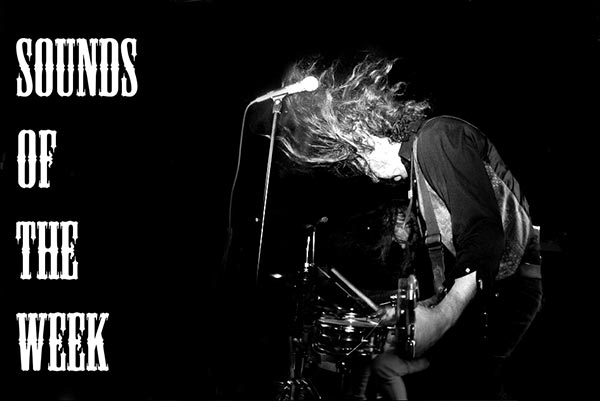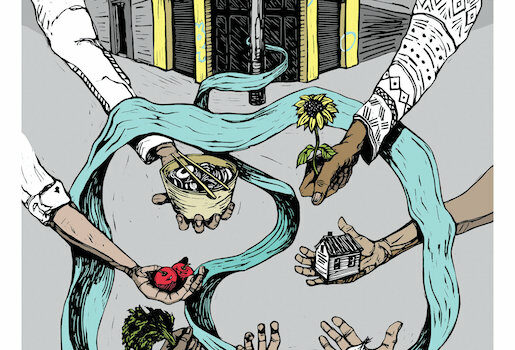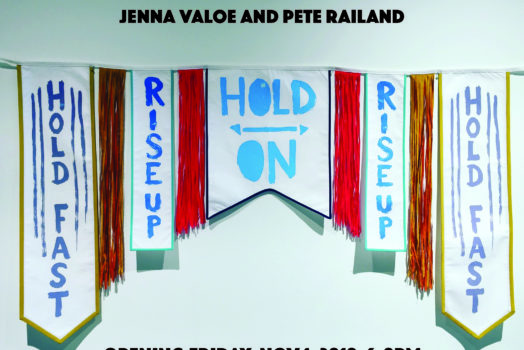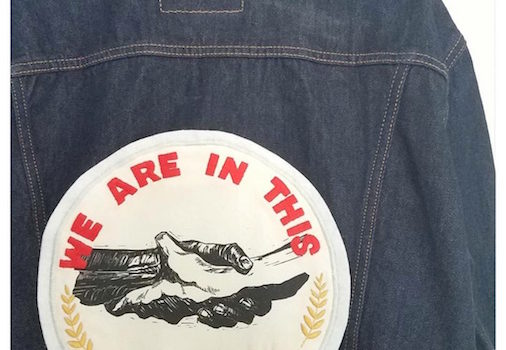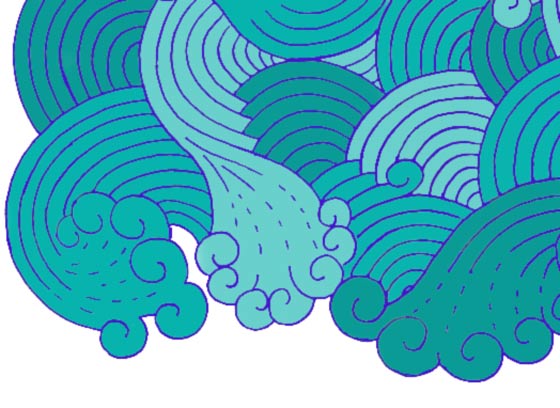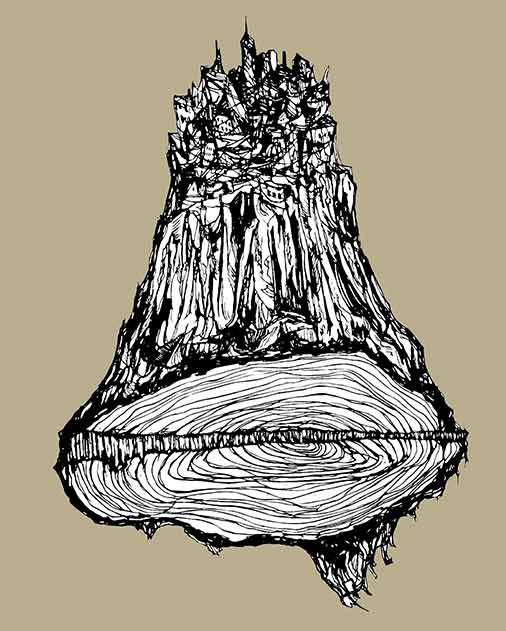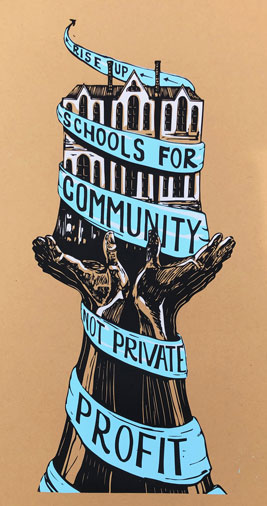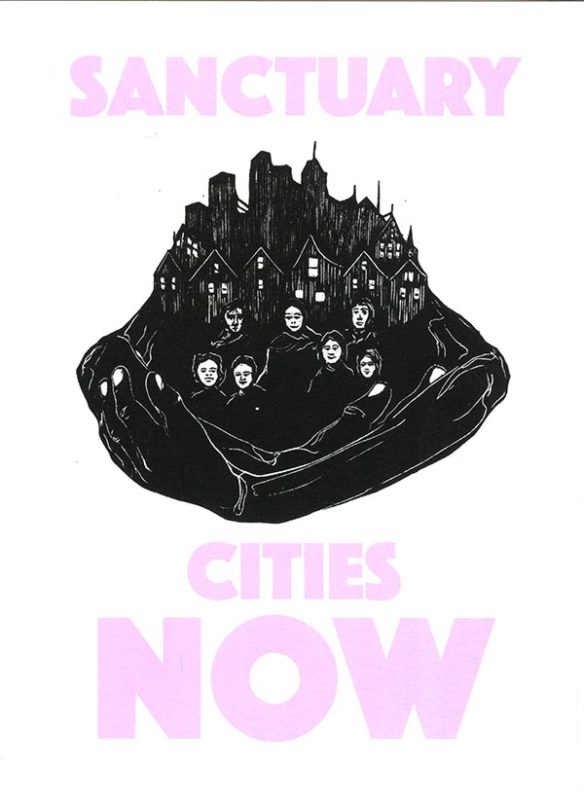Welcome back to Sounds of the Week, the weekly sound musings by members of Justseeds. This week Nicolas Lampert creates a playlist for his new book A People’s Art History of the United States.
Sound Notes From Nicolas Lampert:
In truth I am simply reposting this list from the blog Largehearted Boy. I read this list Nicolas provided and thought Justseeds fans would want to know what to listen to while reading his amazing new book which you can get from Justseeds HERE.
In his own words, here is Nicolas Lampert’ Book Notes music playlist for his book, A People’s Art History of the United States:
Music and social justice movements go hand-to-hand. The Industrial Workers of the World (the IWW or “Wobblies”) was a singing union. Music fueled the foot soldiers of the Civil Rights Movement. Songs of peace and protest have been a constant throughout the decades. Visual art, however, is a different animal. Some view the visual arts as a luxury that is tied to elite culture, or simply as decoration to match the furniture in ones living room. This is unfortunate, but understandable. Visual art has been so absorbed by the market, high-end galleries, and international art fairs that many have dismissed visual art as non-essential. Forgotten is the role of art as a force for agitation. Lost is the fact that visual artists for centuries have been key contributors to the success of social justice movements – be it the abolitionist movement, the early labor movement, the suffrage movement, anti-war movements, the Black Power movement, and the LGBT movements, to name just a few. My book – A People’s Art History of the United States – examines this history of activist art and my song list somewhat mirrors the approach of my book. I draw upon names from the past and present, the well-known artists to the more obscure, the overtly political songs to the more poetic.
Bob Dylan “Masters of War”
I start with Dylan because he is one of the very few musicians that I included in a book devoted to the visual arts. I included a photograph that Danny Lyon took of him playing his guitar and singing on the back porch of a SNCC field office house in Greenwood, Mississippi in 1963. The photo is a gem. Dylan sings while SNCC workers sit around him and converse with one another. Lacking is any sense of fear or the danger that one would expect in the heart of Klan and White Councils country where SNCC workers were routinely targeted. Dylan no doubt was putting his life on the line simply by being present in Greenwood. This experience must have energized SNCC members, as well as Dylan, and it is no wonder that he was the voice of a generation. I know that music cuts across class, race, and gender lines but was surprised to learn that Huey P. Newton – co-founder of the Black Panther Party – was a huge, huge Dylan fan. “Masters of War” is a song that always stops me in my tracks whenever I hear it.
Neil Young “Peaceful Valley”
Neil Young keeps getting better with age. His 2010 Le Noise is a case in point: a true masterpiece and “Peaceful Valley” is one of the choice tracks. It is a haunting song about Western Expansion that presents the darker side of American “progress.” No wonder Greg Kot of Sound Opinions dubs Young’s lyrics as a “Howard Zinn-like alternative history of New World conquest.” I find it remarkable that Young has dedicated much of his current energy to climate change activism. The splash page of his website is a weekly plea for action. His most recent entry reads:
Harper’s Head Stuck in the Tar Sands
I was amazed to find that Prime Minister Stephen Harper of Canada, my home country, has his head stuck in the tar sands of Alberta and has forgotten about his responsibilities to Canadians. Trans Canada, a company he backs, is actively pursuing the goal of crossing the United States with the Keystone Pipeline, a money maker for a chosen few that will cause incredible environmental damage. If it goes through it will be the shame of Canada, an environmental disaster that could have been stopped by responsibility and wisdom. It will not benefit America with energy or new jobs. The oil is for China and the world market, not the USA.
Public Enemy “By the Time I Get to Arizona”
This song still gives me the chills. Public Enemy wrote it after Arizona became one of two states that refused to recognize Dr. Martin Luther King Jr.’s birthday as a national holiday. The song imagines PE traveling to Arizona to assassinate the racist governor. Check out the video.
And appreciate the lyric: “I urinated on the state while I was kickin’ this song.”
Dead Moon “Johnny Got a Gun”
Dead Moon – now Pierced Arrows – is the real deal. This song just might make you thrust your fist into the air. The lyrics speak of a beaten-down working class – the 99% – rising up against the wealthy and the military industry complex. For some reason (probably because it is a women signing) this is my daughter’s current favorite song. She is four and when I play it on the car CD player she sings along and throws her fist up and sings along.
Black Sabbath “War Pigs”
For those of us who grew up on metal, there is no better anti-war song than Sabbath’s “War Pigs.”
Generals gathered in their masses
Just like witches at black masses
Evil minds that plot destruction
Sorcerers of death’s construction
In the fields the bodies burning
As the war machine keeps turning
Death and hatred to mankind
Poisoning their brainwashed minds
Oh lord yeah!
Politicians hide themselves away
They only started the war
Why should they go out to fight?
They leave that role to the poor.
The Minutemen Double Nickels on the Dime
Is it okay to list an entire album instead of a single song? Especially since the Minutemen songs are often one minute or less and each track is completely EPIC. The Minutemen continuously championed punk rock as a tool for political commentary. When D. Boon died in a car accident in 1985 punk lost one of its greatest poets.
Ai Weiwei – Dumbass
Leave it to the most important political artist of our time – Ai Weiwei – to make a rock video about his own prison detention by the Chinese government. Weiwei disappeared in 2011 when he was held for 81 days by Chinese authorities
without any official charges being filed. The video, like much of his work, mocks the Chinese government and its autocratic undemocratic rule. Weiwei remains the example of a visual artist taking a lead role in voicing the dissent of the masses. He is courage personified.
Johnny Cash “Apache Tears”
Johnny Cash’s album Ballads of the American Indian: Their Thoughts And Feelings: The Battle Of Wounded Knee was buried by the country music establishment and commercial radio essentially refused to play it when it was released in 1973. Why? Because it was intensely political and spoke of the many injustices that Native peoples continue to face. Cash (who is part Cherokee) would learn what many political artists know all too well: what it is like to be marginalized.
Joe Hill “There is Power in the Union”
here’s Billy Bragg’s version:
Joe Hill was silenced in 1915 but his songs are still sung today. He was an IWW poet and songwriter that was executed by the State of Utah by firing squad on trumpeted up murder charged. I fondly recall many of his songs being the soundtrack of much of the street protests during the Wisconsin Uprising and the two-week occupation of the State Capital during the glorious winter of 2012.
Paul Robeson “Joe Hill”
The great baritone’s tribute to Joe Hill.
On a side note Robeson performed arguably one of the most important and unusual concerts of the twentieth century when he performed on May 18, 1952 at the Peace Arch Park on the US-Canada border just south of Vancouver. Robeson had been invited to Canada by a labor union but the US government seized his passport and refused to allow him to leave his own country. So instead Robeson performed as close to Canada as he could. He sung on the back of a flat bed truck to an audience of 40,000 who stood on both sides of the border to hear him sing and speak his mind.
Woody Guthrie “Ludlow Massacre”
One of my favorite moments in the documentary film about Howard Zinn – You Can’t Be Neutral on a Moving Train – is when Zinn described how the Guthrie song inspired him to research the Ludlow, Colorado labor massacre in 1914. He noted that he had never heard about it during his many years of schooling, even in the PHD program in history from Columbia University. It goes to show that listening to music can be an education in itself and the springboard for ones activism.
Disposable Heroes Of Hiphoprisy “California Über Alles”
Virus 100 – a compilation album of Dead Kennedy songs that celebrates the 100th release on the Alternative Tentacles label by bands on the label and friends of the label – is one of my all time favorite cover albums. And one of the choice tracks is by the Disposable Heroes Of Hiphoprisy with Michael Franti updating Jello Biafra’s lyrics to reflect California’s current political crisis (circa mid-90s.) Here is a sample:
I’ll keep cuttin’ Public Education
Even though we rank 54th in the nation
I’ve got a plan for all the minorities
Send’em to the California Youth Authorities
From San Francisco Urban Elementary
To Pelican Bay State Penitentiary
There they can work for the master race
And always wear a happy face
Close your eyes, it can’t happen here
Big Brother in a squad car’s comin’ near
Come enjoy the surf and the sun
And help California number one!
Nina Simone “Mississippi Goddamn”
Mississippi was ground zero for the Civil Rights movement. Home to some of the worst atrocities against African Americans and Civil Rights workers – the campus riot at the University of Mississippi over the enrollment of James Meredith in 1962, the murder of NAACP leader Medgar Evers in 1963, the murders of James Chaney, Andrew Goodman, and Michael Schwerner in 1964, to name a few.
Simone summarized her disgust with racism with a song title that said it all: “Mississippi Goddamn.”
Rodriguez “I Wonder”
I learned about his music in the same manner that the majority of us did: from the documentary film. I love the fact that an obscure record by a humble working class Detroit songwriter could become a key soundtrack for the anti-apartheid movement. Now that is the power of art.
CSNY “Ohio”
Not sure what is more intense: Neil Young’s opening guitar riff or the lyrics that describe the tragedy and the State-sponsored murders at Kent State University in 1970.
Tin soldiers and Nixon’s coming,
We’re finally on our own.
This summer I hear the drumming,
Four dead in Ohio.
Bruce Springsteen “Youngstown”
I have never been a big Springsteen fan but I really like two of his more minimal and sparse albums: Nebraska (1982) and The Ghost of Tom Joad (1995). The latter of which features the song “Youngstown” which is about the mid-sized Ohio industrial city and could easily be the soundtrack to the economic decline in the Midwest as factory jobs have moved away in droves over the past 30 years, especially under NAFTA.
Sam Cooke “A Change is Going to Come”
Leave it to one of the greatest voices of all time to sing the ultimate song of hope and persistence to keep on keeping on.
